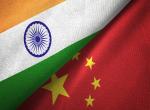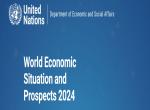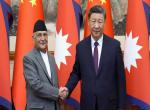The relationship between democracy and international security is frequently debated in international circles. It is also said that more prosperity at the international level is conducive for global security. How true are these propositions, in fact?
There is no accepted definition of democracy. The world’s most liberal countries call themselves democracies and so do the world’s most authoritarian regimes. Who then lays down authoritatively universally applicable norms of democracy?
Any country’s political system, in reality, cannot be divorced from its history, tradition and culture. That is why even Western democracies are not identical. Many non-Western countries believe their systems respond better to the needs of their societies. The issue is how to balance community interests and individualism. Who will decide on a definitive answer to this old debate?
There is a crusading spirit behind the Western advocacy of democracy. Its yardsticks for democracy are prescriptive. Whereas in the West democratic systems took long decades to evolve, non-Western countries are expected to move quickly towards the Western version of democracy. In their case, the process is sought to be accelerated through external political interference and pressure, and in some cases by military means.
The selective application by the West of the weapon of democracy by targeting political adversaries and sparing allies and friends makes the international debate on democracy and international security even more controversial.
The West’s hubris about its democratic vocation is such that after the collapse of the Soviet Union, history had ended for some with the definitive triumph of democracy. This has not happened. Early Russian experience of democracy has, on the contrary, been unsatisfactory. The coloured revolutions in former Soviet space held up great democratic promise, but that promise too has faded.
The “Arab Spring” hardly describes accurately the phenomenon of change that has affected this area. The ouster of dictators by the street was too quickly labelled as a grassroots democracy movement. The sceptics saw the Islamists stepping into the political breach created by social media activists. In Tunisia, the government with Islamist tendencies has come to power. In Egypt, the Muslim Brotherhood and the Salafists have won a majority in parliament. The public in these countries has preferred to express its political aspirations not through secular parties but Islamic ones with no ideological roots in democracy, In Libya, the uprising against the dictator was tribal in nature with strong Islamic affiliations and not a movement for democracy. In Syria, too, the opposition to the Assad regime has less to do with democracy than a sectarian effort to create a situation that would invite foreign intervention on the Libyan pattern.
To some extent, the Egyptian example, whatever the complexion it has taken now, encourages the exercise of street power to overthrow entrenched dictators or regimes divorced from the aspirations of the people. Some nervousness about the fallout of the Arab Spring has been felt by the Chinese government. In Russia, too, street demonstrations against the fairness of the last parliamentary elections and later against Putin’s decision to stand again for election seemed to have been partially inspired by the Arab example. But the force of this example has been lost because its end result has been regressive in many ways. The limits of the so-called Arab Spring to threaten authoritarian regimes across the world are starkly exposed by the fact that it is the leading authoritarian Gulf states that are today the strongest backers of this phenomenon.
As regards international security, we use the term constantly as if its meaning is clear. It is not. No global security architecture exists as yet; nor does any mechanism to provide equal security to all nations. Some countries possess nuclear weapons or highly advanced conventional forces. The vast majority possesses neither. Whereas the regional powers have a smaller circle of security interests, the big powers see their security interests extending far beyond their immediate neighbourhood They conflate their national security interests with international security.
In this situation, who is responsible for international security? The United Nations Security Council? For the developing countries, the UNSC is not sufficiently representative as it no longer reflects the shifts in global power since 1945. Is it Nato with its out-of-area operations? Is it the defence alliances that exist in West Asia and the Asia Pacific? Did military action taken against Iraq or Libya, and potentially contemplated against Syria and Iran, have “international security” as a shared international objective? Was the intervention in Afghanistan to oust the Taliban for assuring such security? And if so, is the self-imposed deadline for withdrawal by 2014 by cutting a deal with the Taliban for “international security”?
Some would argue that the tendency to intervene in the internal affairs of countries, to not respect the sovereignty of States, to use human rights and democracy issues for allegedly geo-political reasons, to promote controversial doctrines such as the right to protect do not necessarily enhance international security, rather they create tensions and a sense of insecurity in many parts of the world. Power is even now so unequally distributed within the international system that the dominant West has the freedom to conceptualize and apply these new approaches to others.
The view that democracies do not fight with each other carries the implication that if democracy spreads across the globe the world will become peaceful. No doubt the trans-Atlantic space occupied by mature Western democracies is peaceful. But if the world’s foremost democracies do not fight each other they are quite prone to fight others. The Korean and Vietnam wars, the Falklands war, the Nato action against Yugoslavia, the wars against Iraq, the Nato action against Libya, the Afghanistan war — all involve Western democracies. Iran is being threatened with military action by them and Syria is in their cross-hairs, irrespective of the terrible human costs that follow all such interventions. The argument that such wars prevent dictators from committing even greater atrocities on their own populations may be defensible up to a point, but the geo-political calculations behind such regime change policies are evident. It would be naïve to believe that powerful countries are moved only by altruistic reasons.
The prosperity argument also does not bear scrutiny. The Cold War was not motivated by prosperity issues on either side. China’s claims to the South China sea, its aggressive posture on Taiwan, and its differences with India and Japan have nothing to do with difference in prosperity levels. Neither do India-Pakistan differences. Iran’s nuclear challenge does not stem from economic deprivation. The solution to Russia-West issues or Russia’s relations with its immediate neighbours do not lie in increased prosperity in these countries.
The West has a good product to sell in terms of its mature version of democracy. The problem is with its aggressive political salesmanship, to the point of relentlessly vaunting the qualities of its product and even thrusting it forcibly on others. The way India sees it, the case for democracy is strong and self-evident, but it has not been won as it is overlaid with geo-political calculations and aggressive political structuring at the international level without regard to human costs.
Published in The Telegraph 30th May 2012


_1_0.png)






Post new comment